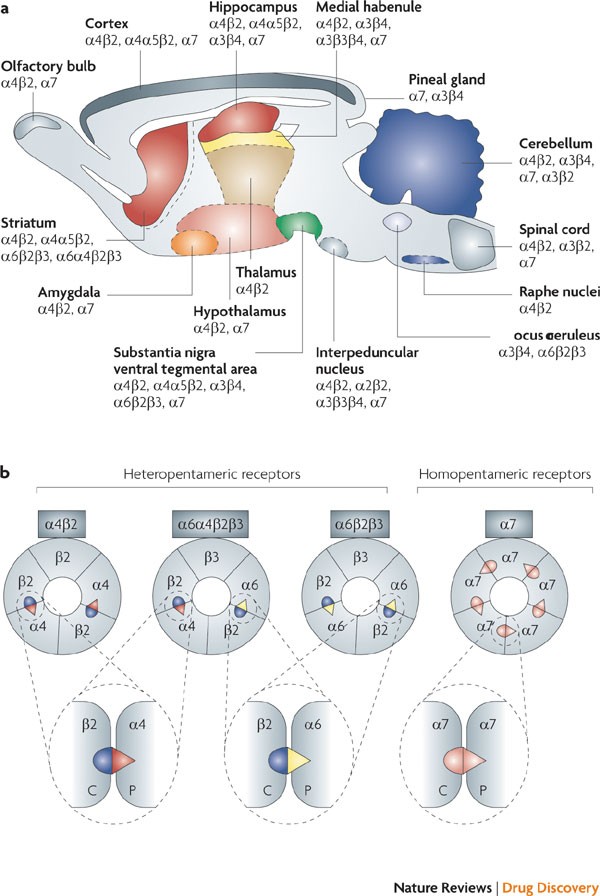Nicotine is an addictive stimulant that is found in many products, such as cigarettes and chewable tobacco. While nicotine has long been known to be an addictive substance, its effects on the body are still being studied. Nicotinic receptors are proteins found in the brain that interact with nicotine and are believed to be responsible for the addictive effects of the drug. In this article, we will discuss what nicotinic receptors are and how they work in the body.

Contents
What Nicotinic Receptors Do
Nicotinic receptors, also known as acetylcholine receptors, are proteins located on the surface of cells. They act as a gateway for communication between cells, allowing them to interact with each other. These receptors are responsible for a variety of physiological processes, including memory formation, vision, muscle movement, and attention. They are also involved in controlling the release of neurotransmitters such as dopamine, noradrenaline, and serotonin.
Nicotinic receptors are activated when nicotine binds to them. When this occurs, the receptor sends a signal to the cell, which triggers a response. This response can vary depending on the type of receptor and the amount of nicotine present. For example, nicotinic receptors in the brain can cause an increase in the release of neurotransmitters, leading to alertness and improved cognitive performance.
Types of Nicotinic Receptors
Nicotinic receptors can be divided into two main types: ionotropic and metabotropic. Ionotropic receptors are found mostly in the central nervous system, where they are responsible for fast transmission of signals. These receptors are activated by acetylcholine, which binds to a specific site on the receptor, causing an electrical signal to be sent to the cell. Metabotropic receptors are found primarily in the peripheral nervous system and regulate slower responses.
Benefits of Nicotinic Receptors
Nicotinic receptors play a role in many important physiological processes, such as memory formation, muscle movement, vision, and attention. They can also help to reduce symptoms of anxiety and depression, as well as improve cognitive performance. By maintaining proper functioning of these receptors, people can improve their overall health and well-being.
The Role of Nicotine in Nicotinic Receptor Activation
Nicotine is a chemical that can bind to nicotinic receptors and activate them. When this occurs, it triggers the release of neurotransmitters, which can lead to a variety of effects. Nicotine can also lead to addiction, as it produces pleasurable feelings that can be difficult to resist.
The Effects of Nicotine on Nicotinic Receptors
Nicotine can have both positive and negative effects on nicotinic receptors. On the one hand, nicotine can help to improve memory formation and cognitive performance. On the other hand, nicotine can lead to addiction, as it produces feelings of pleasure that can be difficult to resist.
The Role of Nicotinic Receptors in Disease
Nicotinic receptors play a role in many diseases, including Alzheimer’s, Parkinson’s, and schizophrenia. In these diseases, the receptors become damaged or malfunction, causing a variety of symptoms. Researchers are currently studying the role of nicotinic receptors in these diseases in order to develop treatments that can target these receptors and improve patient outcomes.
Frequently Asked Questions
What are Nicotinic Receptors?
Answer: Nicotinic receptors are a type of neurotransmitter receptor that respond to the neurotransmitter acetylcholine. They are located in the central and peripheral nervous systems and are involved in many important physiological and psychological processes. They are primarily responsible for the release of catecholamines, which are responsible for the regulation of mood, arousal, attention, and reward.
What is the Function of Nicotinic Receptors?
Answer: Nicotinic receptors have various functions depending on their location in the body. In the central nervous system, they play an important role in the transmission of signals between neurons, allowing them to communicate with each other. In the peripheral nervous system, they are involved in controlling muscle contraction, as well as in the release of hormones. Nicotinic receptors also play a role in the reward system and in the regulation of mood and arousal.
What Are the Different Types of Nicotinic Receptors?
Answer: Nicotinic receptors can be divided into two main types: alpha and non-alpha. Alpha nicotinic receptors are activated by acetylcholine, while non-alpha nicotinic receptors are activated by other neurotransmitters, such as serotonin, dopamine, and GABA. Both types of nicotinic receptors are involved in the control of muscle contraction, as well as in the release of hormones.
What is the Role of Nicotinic Receptors in Addiction?
Answer: Nicotinic receptors play an important role in addiction, as they are involved in the reward system. Drugs such as nicotine, alcohol, and opioids activate nicotinic receptors, causing an increase in dopamine release. This in turn produces feelings of pleasure, which can lead to the development of addiction.
Are Nicotinic Receptors Affected by Diseases?
Answer: Yes, diseases can affect the functioning of nicotinic receptors. For example, Alzheimer’s disease is associated with a decrease in the number of nicotinic receptors, which can lead to memory loss and cognitive impairments. Similarly, Parkinson’s disease is associated with a decrease in the number of nicotinic receptors, which can lead to a loss of movement control.
Are There Drugs That Act on Nicotinic Receptors?
Answer: Yes, there are drugs that act on nicotinic receptors. Nicotine replacement therapies, such as nicotine patches and gum, are used to help people quit smoking. Nicotine agonists, such as varenicline, are used to reduce cravings and withdrawal symptoms associated with quitting smoking. Nicotine antagonists, such as mecamylamine, are used to treat nicotine addiction and prevent relapse.
Nicotinic receptors are an important part of the human body, playing a major role in healthy functioning. By understanding what these receptors do and how they interact with nicotine, we can make healthier decisions about our lifestyle and ensure our bodies stay healthy and functioning optimally. With this knowledge, we can help our bodies stay in balance and maintain a healthy lifestyle.

